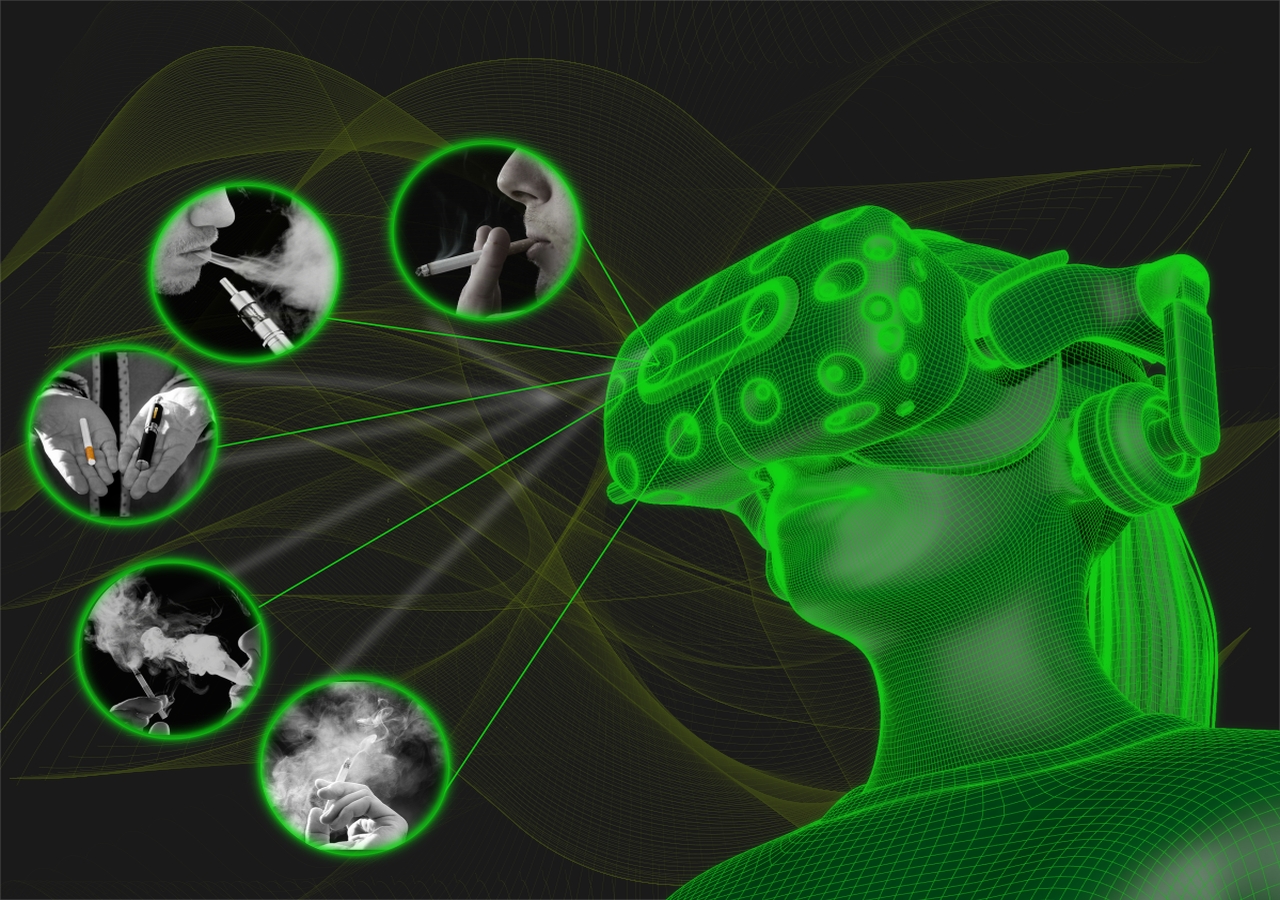Virtual Environments to Study Preventive Health Attitudes (VESPHA)
Towards Personalised Digital Health Services for Preventable Health Conditions – Virtual Reality and Cue Reactivity
2018 – 2022

Summary
To improve preventive health outcomes, a radical shift in thinking needs to be introduced to understand underlying causes of people’s subconscious behaviour to provide personalised digital health services in future; especially to support people most in need.
Currently, health data is mainly collected by using surveys which can lead to bias. The aim of this study was to build a multi-sensory environment that allowed us to measure people’s behavioural and psychophysiological reactions (e.g. increased heart rate, sweat) when placing them into different virtual environments using virtual reality technology and simulating different cue exposure that evoked different subconscious reactions.
We used virtual reality technology to study how people responded to vaping and smoking craving related cues (i.e. virtual reality vaping stimuli). Virtual reality technology allows to precisely design and control what and when participants are exposed to cues and hence, allows to record and analyse data on the effects of those cues on participants.
Five environments were developed in virtual reality (VR). All environments contained multiple vaping cues: for example, poster advertisements, avatars vaping, and televisions showing various vaping tricks (where the vapour is exhaled in a specific form). Participants were exposed to each of those environments, in randomised order, and with a distraction scene in between each environment. During exposure to the environments, heart rate variability (HRV), skin conductance (SC), and pupil dilation was measured and subjective craving assessed in VR. Eye tracking was also used to register whether participants were looking at the vaping cue.
Acknowledgement
This project was funded through a Health Research Council (HRC) of New Zealand Explorer Grant, number 18/738.
Contact
A/Prof. Simon Hoermann, School of Product Design, University of Canterbury
Research Team
-
- Dr. Melanie Tomintz, GeoHealth Lab, University of Canterbury
- A/Prof. Simon Hoermann, School of Product Design, University of Canterbury
- Dr. Maria Vega Corredor, Geospatial Research Institute Toi Hangarau
- Dr. Merel Keijsers, HIT Lab NZ, University of Canterbury
- Nawam Karki, HIT Lab NZ, University of Canterbury
Research Outputs
-
- Vega-Corredor MC, Hoermann S, Watkins A, and Tomintz M. (2023). Design Insights to Support the Development of Effective Virtual Reality Nicotine and Vaping Dependency Therapy Scenarios for Future Telehealth, in Telehealth and Telemedicine – The Far-Reaching Medicine for Everyone and Everywhere. Wang, T.-C. (Ed.). IntechOpen. DOI: http://dx.doi.org/10.5772/intechopen.106958
- Keijsers M, Vega-Corredor MC, Hoermann S, Tomintz M. (2022). Cue Reactivity to Electronic Cigarettes: A Systematic Review. Substance Abuse: Research and Treatment. 2022;16. doi:10.1177/11782218221114971
- Keijsers M, Vega-Corredor MC, Tomintz M, Hoermann S. (2021). Virtual Reality Technology Use in Cigarette Craving and Smoking Interventions (I “Virtually” Quit): Systematic Review. J Med Internet Res. 2021 Sep 17;23(9):e24307. doi: 10.2196/24307. PMID: 34533471; PMCID: PMC8486991.
- Tomintz M, Vega-Corredor M, Hoermann S, and Karki N. (18 September 2019). Designing virtual reality environments to study vapers behavioural and psychophysiological reaction in New Zealand. New Zealand Geospatial Research Conference. Queenstown.
- Tomintz M, Karki N, Vega-Corredor M, and Hoermann S. (20 August 2019). Design and development of virtual environments to assess cravings related to vaping. HRSC Poster Evening, Christchurch.
- Tomintz M, Vega-Corredor M, Hoermann S, and Karki N. (15 April 2019). Virtual Environments to Study Preventive Health Attitudes Case study “VAPING”. Geography seminar series. University of Canterbury. Christchurch.
More Information
-
- The Geospatial Research Institute Toi Hangarau (2024). Towards personalised digital health services for preventable health conditions – virtual reality and cue reactivity.
- Australian New Zealand Clinical Trials Registry (2021). Smokers’, vapers’, and non-users’ reactions to vaping cues presented in virtual reality, ACTRN12621000511831p.
- Health Research Council of New Zealand (2018). Towards personalised digital health services for preventable health conditions.
- Health Research Council of New Zealand (4 April 2018). Bold new research gets nod from HRC.
People

Melanie Tomintz

Simon Hoermann

Merel Keijsers

